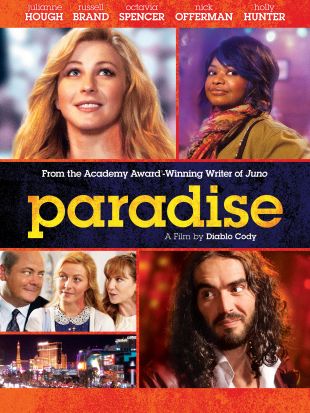
Having proven herself as an entertaining and inspired screenwriter again and again with titles like Juno, Young Adult, and United States of Tara, Diablo Cody tries her hand at directing as well with the 2013 dramedy Paradise. In many ways, this modest little indie film is far from a high-stakes hypefest: It's just a small movie about a handful of regular people trying to figure themselves out, and it would seem like the perfect project for a first-time director to cut her teeth on. And yet Cody can't help the fact that what makes her writing so interesting, and even divisive at times, is the seemingly impossible balance she strikes between fantasy and reality, between earnest emotion and meta fourth-wall breaking -- elements of a script that, it turns out, are pretty challenging to orchestrate onscreen. As a result, Paradise falls pretty flat sometimes. But the movie has heart, and that has to count for something.
The first ambitious angle that the picture deals with is the backstory of its protagonist, a woman named Lamb (Julianne Hough). Raised in a conservative religious community in which she's never been allowed to wear pants, cut her hair, or watch movies or TV, Lamb was horribly burned in a plane crash a few years ago and has to wear a supportive stretch garment over her arms and legs to protect her skin grafts. The pain has robbed Lamb of her faith, and so, much to the horror of her parents (Holly Hunter and Nick Offerman), she takes her settlement money and goes to Las Vegas, city of sin, to make up for the fun she's been missing out on since birth for a God she no longer believes in.

Lamb heads to a bar and befriends a slick British bartender named William (Russell Brand) and his best friend, a tough-talking nightclub singer named Loray (Octavia Spencer). One thing the movie gets right is the surrogate-family vibe between William and Loray, which makes it pretty easy to accept them instantly bonding with this new girl -- another expat of the outside world, just like them. The three embark on an all-night mini-tour of the city together, giving Lamb ample opportunities to play Starman-esque cluelessness for comedy as she encounters everything from alcohol to pop music to ethnic diversity for the first time. But, of course, these events exist mostly as a backdrop for conversation and character development, as the three fumble toward figuring out why they came to Vegas in the first place.
If this plot summary leaves you scratching your head about the tone of the film, your confusion is justified. Sadly, Cody seems to have been a bit overwhelmed by the varied nature of her own writing. When Jason Reitman directed Cody's script for Juno back in 2007, he probably faced similar challenges. How do you make the film sincere enough to let the silly jokes land, yet cynical enough to let the dark ones land too? How do you reconcile the quasi-satirical voice-over with the somber, weighty subject matter of the plot? Never quite able to establish a mood that accommodates all of her script's disparate aspects, Cody's direction stays fairly monotone -- which doesn't really do the story justice.

In the scene in which Lamb first sees Octavia Spencer's character performing her act, Spencer is wearing a red sequined dress and sitting down on a dingy stage singing a heartfelt torch-song rendition of "No Surprises" by Radiohead while getting heckled by drunken fat men. This scene should be mind-blowing. But apparently unable to adjust the film's emotional tone from behind the camera, Cody lets it whiz by like every other moment. Likewise, while Lamb's voice-over might have read on paper as a reference point, juxtaposition, or a source of irony, the way that it's presented in the film offers zero subtext: It's just a ham-fisted, unnecessary move. Even still, the mere fact that Cody's writing evokes such a benefit of the doubt speaks to her abilities, and nobody is claiming that directing her unique work is an easy job. The movie's characters are written and played with such heart that it's tough to say there isn't something basically loveable about Cody's first film, and it's impossible to say she shouldn't keep at it and make another one.
